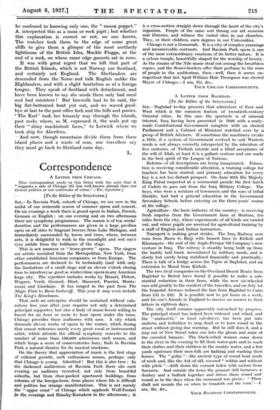Correspondence
A LETTER FROM CHICAGO.
[Our correspondent sends us this letter with the note that it "`suggests a side of Chicago life less well known abroad than our vicious politics or our outbreaks of crime."—ED. Spectator.]
[To the Editor of the SPECTATOR.]
Sin,-In Ravinia Park, suburb of Chicago, we are now in the midst -of our sixteenth season of summer opera and concert. On six evenings a week there is grand opera in Italian, French, German or English ; on one evening and on two afternoons there are symphony programmes. The season is of ten weeks' duration• and the performances are given in a large pavilion open on all sides to fragrant breezes from Lake Michigan, and immediately surrounded by lawns and trees, where, between acts, it is delightful to walk in the moonlight and rest one's eyes awhile from the brilliance of the stage.
This is not amateur or " home-grown " opera. The singers are artists recruited from the Metropolitan, New York, from other established American companies, or from Europe. The performances are declared to be technically (and with only the limitations 'of a small stage and an eleven o'clock closing time to interfere) as good as winter-time opera in any American large city. The repertoire includes works by Mozart, Flotow, Wagner, Verdi, Gounod, Bizet, Massenet, Puccini, Monte- mezzi and Giordano. It has ranged in the past from The Magic Flute to Boris Godunoff. This year it may even include The King's Henchman.
That such an enterprise should be sustained without cala- mitous loss year after year requires not only a determined principal supporter, but also a body of music-lovers willing to travel for an hour or more to hear opera under the trees. Chicago provides these audiences with ease. A city which demands eleven weeks of opera in the winter, which during that season welcomes nearly every great vocal or instrumental artist, which attends the official symphony concerts to the number of more than 150,000 admissions each season, and which keeps a score of conservatories busy, finds in Ravinia Park a natural theatre for its musical emotions.
On the theory that appreciation of music is the first stage of cultural growth, such enthusiasm means, perhaps, only that Chicago is young. Admitted ! But this is also true : In the darkened auditorium at Ravinia Park there sits each evening an audience recruited, not only from beautiful suburbs, but from close-packed apartment buildings, from colonies of the foreign-born, from places where life is difficult and politics has strange manifestations. This is not merely the " upper crust " of Chicago which applauds Wolf-Ferrari in the evenings and Rimsky-Korsakow in the afternoons ; it
is a cross-section straight down through the heart of the city's organism. People of the same sort throng our art museum and libraries, and witness the varied rites in our churches. They, or their children, earn degrees in our Universities.
Chicago is not a Gomorrah. It is a city of complex yearnings and inconceivable contrasts. And Ravinia Park opera is one of the most extraordinary creations of its better nature. It is a sylvan temple, beautifully shaped for the worship of beauty. As the strains of the Nile music steal out among the breathless copses, and the flower-borders offer their perfume to the rows of people in the auditorium, then—well, then it seems un- important that last April William Hale Thompson was elected Mayor of Chicago.—I am, Sir, &c., YOUR CHICAGO CORRESPONDENT.






































 Previous page
Previous page